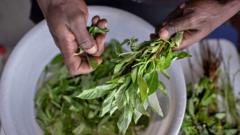In a culinary evolution, indigenous leafy greens in Kenya are shedding their reputation as "poor man's food" and weeds to become sought-after options on restaurant menus and at local markets. The reinvigoration of these traditional vegetables, known collectively as "kienyeji," signals a growing awareness of their nutritional advantages over popular imported greens like cabbage and spinach.
Demand is surging for these local varieties, particularly in eateries such as Skinners Restaurant in Gachie, where staff report an increase in customers requesting kienyeji, despite the higher prices associated with their sourcing. This change reflects a wider trend among Kenyans who increasingly appreciate the health benefits of these nutrient-dense foods, including weight management and detoxification.
Horticulture expert Mary Abukutsa-Onyango has documented a marked increase in the production of indigenous greens, rising from negligible quantities to over 300,000 tonnes last year. Her efforts underline a major transformation in attitudes; the same vegetables once labeled "weeds" are now recognized for their resistance to pests and diseases, promoting organic farming practices.
Despite the cultural revival, challenges remain as historical dependence on introduced vegetable varieties persists. Farmers like Francis Ngiri, who transitioned to organic farming of indigenous crops, report that the soil has degraded due to past agricultural practices that relied on chemicals. Ngiri and his peers are committed to preserving biodiversity by cultivating native plants, navigating legal hurdles surrounding seed exchanges that threaten their efforts.
Stricter seed laws in Kenya complicate the efforts of local farmers who wish to share and sell indigenous seeds. Meanwhile, organizations like the Seed Savers Network work to protect traditional varieties that have been lost to time.
Nonetheless, the tide appears to be shifting, as vendors in bustling markets report heightened customer interest in indigenous greens, propelled by media campaigns celebrating their nutritional superiority. As Kenyan cuisine embraces its roots, a cultural and agricultural renaissance of indigenous vegetables seems on the horizon, showcasing the nation's rich culinary heritage and biodiversity.



















